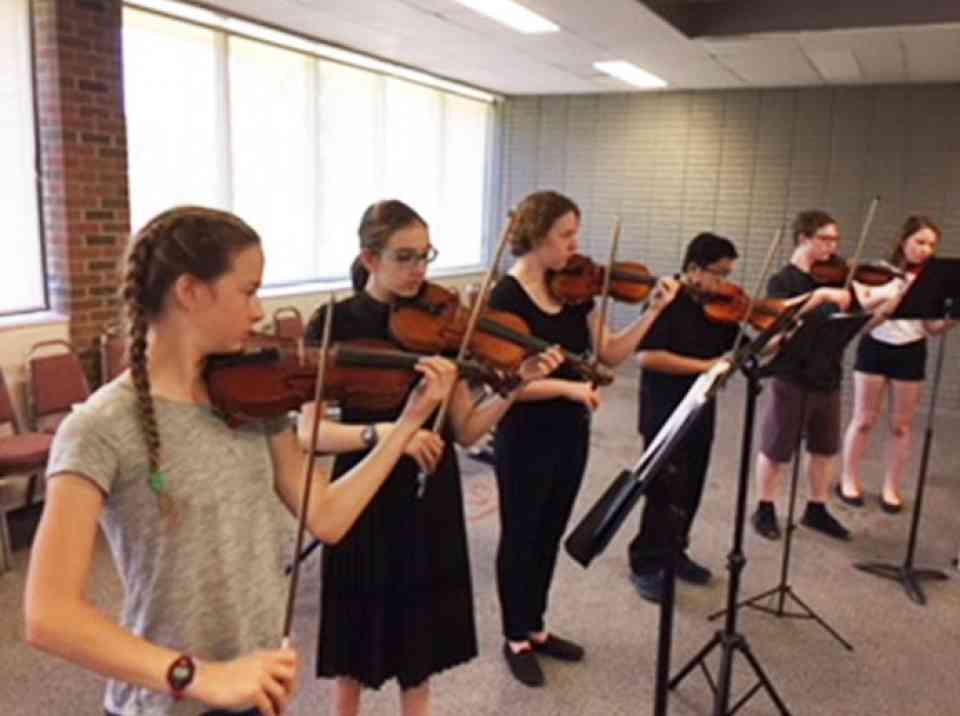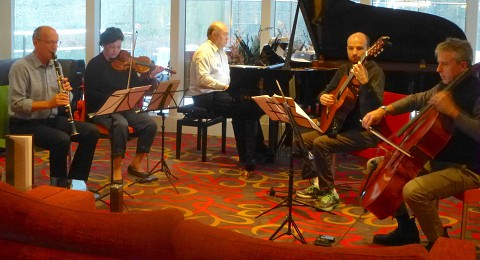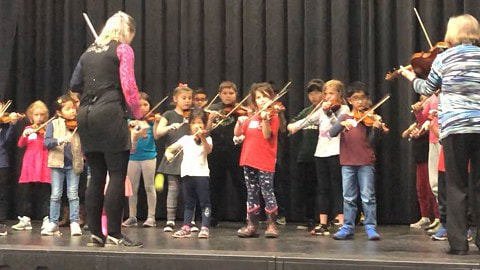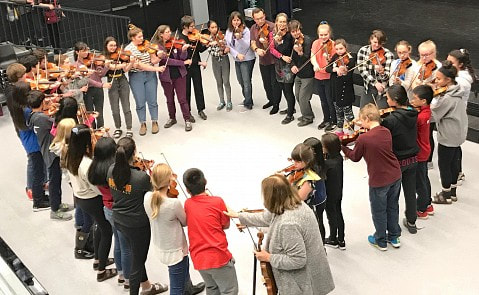|
By Susan Beth Barak - Newmarket, Ontario
We live in an intriguingly evermore interdependent, interdisciplinary world. Violists typically sit central to the harmonies around them and may be more aware of this than others – perhaps that’s why so many of the greatest composers favoured our beloved instrument. Although I relinquished my position as Viola Representative for the Suzuki Association of Ontario this year in order to gain voting rights as the 905 North Area Representative, my viola activities have continued to expand in the past year. In 2018 I became Chair of the Non-Discrimination Committee of the American Viola Society (AVS) and have been particularly involved in leading a review ensuring inclusive and non-discriminatory language in AVS publications. Also related to language, I was privileged to share a presentation at the European Suzuki Viola Gathering in El Escorial, Spain, in February 2019, tying together insights gleaned from my theoretical research into language acquisition as they apply to teaching instrumental music. I am presently synthesizing my academic papers into an article to submit to the American Suzuki Journal. Stay tuned! I highly recommend going to the next ESVG in 2021 – the camaraderie at the Gathering is spectacular and immensely joyful! Kudos to Peter King, Joanne Martin, and Juan Drown for an outstanding job putting together a truly memorable, enriching, and heartwarming event.
0 Comments
By Gail Lange - Guelph, Ontario Suzuki teachers do enjoy their community! So when two Suzuki teachers met in unusual circumstances - a music cruise on the Rhine—there was an instant bond. Let me set the stage. During the past year, two Canadian music festivals – The Parry Sound Music Festival and the Ottawa Chamberfest – sponsored an amazing music cruise on the Rhine river in early October. The program was coordinated by George Zukerman, impresario and Director of Music for Special Travel International of Vancouver, in collaboration with STI Tourist Services of Vancouver. The cruise was preceded by two days of concerts in Amsterdam and followed up by two days of music events in Zurich, including a ballet in the Zurich Opera House. Diana Nuttall, a Suzuki cello teacher from Edmonton, and Gail Lange, a Suzuki piano teacher from Guelph, noticed each other’s names on the passenger list sent to participants before the cruise. So we were watching out for each other at the first welcome dinner. Subsequently, we sought out other opportunities to share perspectives on Suzuki teaching and Suzuki in Canada – not to mention politics in Alberta and Ontario! Strangely, our husbands happily found other things to do during these conversations! The tour was truly a highlight for musicians and lovers of music. The artistic director of the Ottawa Chamberfest is Roman Borys, cellist in the Gryphon Trio. So, a Hamburg Steinway was on board, ready for the Trio’s performances. Also, because the Artistic Director of the Parry Sound Festival is clarinettist James Campbell, we were treated to works for cello, clarinet and piano along with other combinations of instruments. Last but not least, jazz guitarist and composer Graham Campbell sometimes led late evening jazz jam sessions in the lounge. On our last day on the ship, Graham and the others all performed the “Rhine Rhapsody”, a piece he had composed for the occasion. What could be more idyllic than cruising up the Rhine listening to Mozart in a lounge with wide windows suitable for viewing the enchanting scenery on both sides of the river? Each day passengers had excursions to nearby cities such as Heidelberg and Strasbourg. The most notable one, however, was the stop in Bonn, where our musicians performed a concert in a recital hall adjoining Beethoven’s birthplace. Bonn is making big preparations for Ludwig’s 250th birthday in 2020, but we were fortunate to be there early! Of course, Diana and I each had our pictures taken in front of Beethoven’s statue in the main square. A side note: in Zurich, our post-cruise stop, Diana and I found an amazing music store, “MusikHug”, where there was a full floor of cellos, and another one of pianos and harps. Too bad nothing would fit in our suitcases! Just in case anyone is interested, the Gryphon Trio will do a music cruise on the Danube with Ama Waterways’ Ama Viola next September. We will be watching for it! Sarah Hensen, a former Kingston Suzuki cello student herself, attended the recent SAO conference and shared her thoughts with KMK:
My daughter has attended the Institut Suzuki Montreal and the Southwestern Ontario Institutes since she was 6 years old. This past summer because of conflicts she could not attend either. So when the opportunity arose to attend the SAO conference in Guelph we were so happy. My favourite part of Suzuki: you are not learning on your own but learning within a community. Arriving at the workshop, we ran into Paule Barsalou and she said “So nice to you again, Mirren, my goodness you are getting so tall.” For me as a parent, this is so touching to hear: teachers remember the children from year to year. It’s really lovely to have this familiarity and to be in a space where everyone feels that they belong. Though Mirren was the only Kingston student to attend, the smiles and the comfort level was soon evident even with the kids she didn’t know. As for myself, Teri Einfeldt’s parent talk gave me inspiration and a reminder that as a parent we are not alone. It was helpful to hear that other people have challenges, that their child too, learns differently and that in a world where everything is so competitive – even when people try not to make it this way—the Suzuki method allows you to move at your own pace. The 2019 SAO Student Day more than fulfilled all expectations for Mirren and myself. It was so worth the five hour drive from Kingston to attend and we can’t wait for the 2020 SAO Conference in Kingston! Interview Notes compiled by Karen-Michele Kimmett By Anita Buttemer - Waterloo, Ontario Recently my colleagues and I from Suzuki Talent Education of Waterloo (STEW) attended the annual student and teacher conference of the Suzuki Association of Ontario (SAO). This year the conference was in Guelph. Bravo Guelph Conference team! As has been the case every year, the teachers at STEW highly valued our time away together. We had 100% attendance by our faculty. Since the SAO Conference moves to a different venue every year, the experience is different as well. We are particularly happy that our colleagues from neighbouring provinces and states also attend when travel distances allow. On the Student Day, we had the opportunity to observe our students in group classes taught by wonderful teachers, and our students were able to reconnect with friends from past Suzuki institutes and workshops. These bonds are special ones – the children skipped to class, ate pizza, and had to chance to play their favorite pieces together. As teachers, the opportunity to chat with colleagues over dinner and back at the hotel is priceless. The chance to “talk shop” and discuss interpersonal challenges we encounter on a daily basis as Suzuki teachers, and in some cases as “practice parents”, brings home to us how person-to-person communication cannot be replaced by all the wonderful technology we now have at our fingertips. On the Teacher Day, we very much enjoyed informally meeting and chatting with colleagues. Some were new Suzuki teachers at their first conference. Others we may only be able to see once every few years, due to geographical challenges, and the scheduling conflicts that naturally come from being performing musicians.
The keynote speakers at these SAO conferences are always thought provoking. The subjects are as varied as the locale of the event. Sometimes we are blown away by new ideas and new approaches. Sometimes we are affirmed that our teaching approach is on the right track, and that we are happily on the same page as the esteemed guest speakers. Either way, the experience is invaluable. I encourage all teachers to find a way to connect in person with our Suzuki community, whether it be attendance at a workshop, conference, convention, or merely driving to a “nearby” town to observe a colleague’s lessons for the day. Although we have geographic diversity and challenges, our commonalities as Canadian teachers greatly outweigh our differences. We can come together with music and make our country a better place! By Vivien Tzau & Sam Isono – Etobicoke, Ontario
Our family had the pleasure of attending the SAO Student Day in Guelph on November 2, 2019. Like prior SAO workshops, this particular one did not disappoint! Our daughters, Tea (cello, Book 3) and Scarlett (violin, Book 1), benefitted immensely from their exposure to a different group of quality Suzuki teachers with different teaching methods, and their engagement with children from other Suzuki music schools in a unique group class and play-in. On this special day, the girls strayed from the customary and gained refreshing new experiences that will further develop their musical skill, knowledge and character. Young students in Scarlett’s enrichment class practised contrasting dynamics, rhythms, pattern recognition, movement, and ensemble playing, without fully appreciating at their young age that they were learning various musical elements and developing their listening skills. From Scarlett’s perspective, she was simply having fun! In Tea’s enrichment class, she was introduced to Bal-A-Vis-X for the first time. Tea thoroughly enjoyed the series of balance, auditory, and vision exercises, as did many of the observing parents who joined in. Deeply rooted in rhythm, these exercises kept the students focused and their brains sharp! We will definitely be applying these fun exercises at home. We love that Scarlett was able to observe the senior violin group class, and that Tea was able to observe students’ piano performances accompanied by a string quartet. The children are not the only ones who benefitted from this workshop. As parents, we love that we had the opportunity to marvel at the beautiful rich tones that filled the music hall when thirty cellists performed “French Folk Song” and “Scherzo” in synchronized harmony. And more importantly, we love that we were reunited with families that we have met at previous Suzuki conferences. These connections reinforce our deep sense of community within the Suzuki family. And, as we concluded this workshop we look forward to the next. By Margot Jewell - Toronto, Ontario
Lance Stoney is the only Suzuki trained violin teacher in Fort St. John, a BC town of 20,000 on the Alaska Highway, a 14-hour drive from Vancouver. He has one Suzuki colleague in town, a pianist. The nearest Suzuki violin teachers are in Prince George (4 1/2 hours) and Edmonton (7 hours away). These distances make it difficult to collaborate with musicians outside of Fort St. John, although Lance and some of his senior students participate in a summer orchestra program in Smithers, BC (9 1/2 hours away). At age 3, Lance started studying violin at a Suzuki program in southern BC. He kept playing through high school, and took some RCM practical and theory exams. Then when he started working at other jobs, music went on the back burner. Thirteen years ago Lance moved to Fort St. John for work. People in the community learned he played the violin and a child wanted to start studying with Lance. By 2018, his studio had grown to 60 students so he was able to give up his job in the oil patch. In a phone conversation, he shared the following thoughts: About professional development: * A few years after starting to teach, he decided that he would pursue Suzuki training. Almost every year Lance has taken courses at the Suzuki Institute in Seattle. He also appreciates the opportunity to watch a variety of teachers when at an institute. He feels that people who are “pioneering” need to find out if they are on the right track, and refresh themselves with new ideas. It is harder to access this when living in a more isolated community. He said “personal development as a teacher is a must for building the studio.” * He has continued working on his own playing, successfully completing his grade 10 RCM exam last year. About building a program from scratch in a small community: * You have to be willing to work with all ages. He teaches students from age 4 to 65. * You have to be open to different approaches. Some are people interested in fiddle music and others in sacred music. He explains that “the classical approach is the push-ups and sit-ups of learning the instrument.” Once you have a good foundational technique you can learn any style of music. * Collaborate with the local musical community. He puts his intermediate and senior students together with the adults to make a string group that can accompany the local adult choir in performances of Handel’s Messiah, Vivaldi’s Gloria, Schubert’s Mass. His advice: * Set teaching priorities. Don’t waste time on things that are not as important, or you will get frustrated and irritated by teaching. His vision: * Teaching is fun when you’ve got a range of levels and ages. * The goal is to “provide educational development for the local community; both amateur adults and children.” By Jean Grieve - Oakville Ontario
Last year in our Oakville Suzuki program, we discovered that we did not have enough senior students registered in our association (past Book 4) to run our advanced violin groups. We decided to offer a quartet program where each group arranged with a teacher to meet at a time everyone could manage for approximately 18 sessions in the year. To our surprise a large number of students signed up, and we formed eight quartets and all registered with Oakville Suzuki. We set two pieces that everyone could play together at our Senior Christmas concert, and arranged for a special masterclass with Witold Swoboda in April where each group performed a classical piece. Several of the quartets also performed at festivals and seniors’ residences. The most successful groups were those where the students were already friends, and they signed up again this September. We now have five groups but one has not been able to find a teacher at a time when the students can get together. This is one of the biggest problems when parents, teachers, and students are very busy. There is no doubt, however, that we will continue to offer the option for our senior students. By Paule Barsalou - Guelph, Ontario
Canada was well represented at the 2nd International Suzuki Teacher Trainer Convention 2019 in Madrid in October. Canadians present were Suzuki teacher trainers Paule Barsalou, Wan Tsai Chen, Carey Alain Cheney, David Evenchick, Susan Gagnon, Dorothy Jones, Sharon Jones, Joanne Martin, Alice Anne O’Neil, Kelly Williamson, and Nicole Wilton. Also present was Margaret Parkin, ESA Instructor of Violin. The format of teacher training in each region and reciprocity between regions were discussed in several sessions. Reciprocity between SAA and ESA is described in the ESA teacher training manual: http://www.digital-e-brochures.com/EuropeanSuzuki/TTraining2018/30/ Dorothy and Sharon Jones presented a session on Suzuki Early Childhood Education. Kelly Williamson presented a session called Time to Stretch! Teacher Training in a New Area, where she outlined her experiences teaching in Latin America. Paule Barsalou was on a panel discussing called Suzuki Teacher Training in Universities, alongside Kathleen Springs from University of Colorado, and Veerle Van Gorp, Wim Meuris, and Wilfried Van Gorp from AP School of Arts in Antwerpen, Belgium. She shared her experience in developing a new long-term teacher training program in a collaboration between Suzuki String School of Guelph and Wilfrid Laurier University in Waterloo, ON. Karen-Michèle Kimmett joined the conference via Skype and spoke on a panel called Suzuki Teacher Training in Diverse Environments, alongside Eduardo Ludueña (who talked about training violin teachers in Latin America), Helen Brunner (who related her recent experience training violin teachers in Russia) and Carmencita Arámbulo (who discussed her experience training piano teachers in the Philippines). Karen shared her experience training violin teachers in South Africa and Zimbabwe in collaboration with trainers Martin Rüttimann and Christophe Bossuat. Joanne Martin spoke on a Panel called Suzuki Teacher Training – Then and Now, alongside Judy Bossuat-Gallic, Christophe Bossuat, Akira Nakajima, Sven Sjörgren, and Tanya Carey. She described her experience as a Suzuki teacher trainer pioneer in Canada. Carey Cheney, David Evenchick, Susan Gagnon and Margaret Parkin were each charged with the delicate task of leading discussions such as Goals for Book 1 and Examinations and Assessment, Suzuki in Universities andMentoring Teacher Trainers, and Reciprocity Procedures and Challenges Suzuki Teacher Trainers are Facing. This was not far from the type of exchanges one would hear at the United Nations! Bravo to this foursome for their tact and diplomacy in handling these discussions. A huge thank you is extended to teacher trainers Martin Rüttimann and Carey-Beth Hockett for their vision in organizing this wonderful conference.  by Laurie Mitchell - Durham, Ontario There are advantages and disadvantages to living outside of a big city. Fewer opportunities without long drives is definitely a disadvantage, so the teachers east of Toronto have worked together to create an affordable summer program in our own neighborhood. The amount of learning that takes place (for students and teachers alike) in one week is amazing and that is partnered with long-lasting gains in motivation! http://www.durhammusiccamp.com The Suzuki String School of Guelph will be offering long-term teacher training at Wilfrid Laurier University again this coming school year. The offerings for 2019-20 are:
Violin Year 1: ECC and books 1 to 4 Teacher trainer: Elayne Ras Cello Year 1: ECC and books 1 to 4 Teacher trainer: David Evenchick Violin Year 2: books 5 to 8 and Practicum Teacher trainer: Paule Barsalou
For more information about the program visit: http://artset.net/sssg/program/program/teachertraining.html or contact: Paule Barsalou [email protected] or 519-836-3798 |



 RSS Feed
RSS Feed